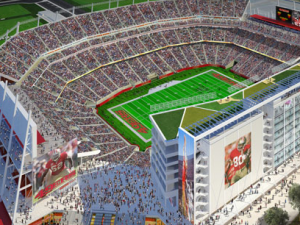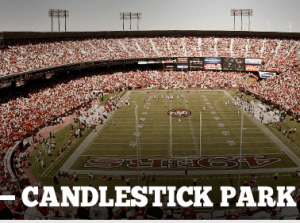There was one thing missing from the great Ars Technica blowout on the proposed Wi-Fi network at the new stadium being built for the San Francisco 49ers: Any mention of networking partner Brocade, which made a big deal about how it was going to help the Niners with a state-of-the-art stadium network.
In a Twitter exchange with the story’s author, Jon Brodkin, he said that the Niners’ networking crew asserted that they hadn’t yet picked a vendor for the access points the network will use. That opinion was not taken well by the folks at Brocade, who have not commented publicly but are most likely having some interesting discussions with their new partner the 49ers.
What it may boil down to is the fact that the Niners’ networking crew is waiting for the next generation of Wi-Fi hardware to come out — most likely built around the new 802.11ac protocol — and since the network isn’t scheduled to go live for another year, it’s probable that they are not yet at final hardware decisions. Though no monetary details of the Brocade agreement were ever revealed, it was supposed to encompass not just building of the stadium network but name-sponsoring an attached meeting room area that Brocade (whose headquarters are close to the stadium site) would be able to use during non-football times.
Then there is the big question about whether or not networking giant Cisco, which also has headquarters within walking distance of the Niners’ stadium, will be involved in any way at all. Cisco, the current big player in the stadium-network space, might be tapped for digital signage or video, but it’s hard to imagine both Cisco and Brocade being “partners.” We are guessing this story is far from over…
Cisco Network in Georgia Dome Profiled
MSR would like to give a shout out to Steve Zurier, who penned this excellent breakdown of the new Cisco Wi-Fi network in the Georgia Dome. Steve, who at one point held down bass guitar duties on our old industry band Kludge, spells out how stadiums are the ultimate BYOD operation. I bet there will be plenty of Cisco employees on hand to “make sure the network keeps working” during the upcoming men’s Final Four.
Verizon makes Lions Wi-Fi Official
We’ve noted here before how Verizon Wireless doesn’t like to call attention to its stadium network deals — probably because it doesn’t want every team clamoring for the same investment — but it is nice to see Big Red come out publicly and talk about the Wi-Fi network it put into Ford Field in Detroit.
What I think is kind of bogus is the fact that the network is available only to Verizon customers; I hope the tradeoff of having a network that only keeps a third of your customers happy is worth it for the Lions, but to me it sounds like a poor decision. Check out the quote from Mark Emerick, Verizon’s director of network operations, about what fans can do if they’ve shelled out thousands for season tickets but have a phone from another provider:
“As fans are frustrated with other carriers they may look to their neighbors next to them and decide to switch.”
Or, they could decide to not come to the games.








